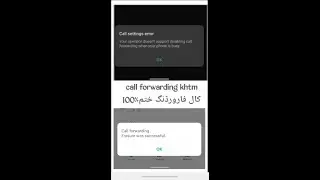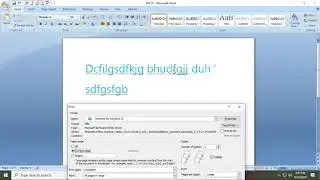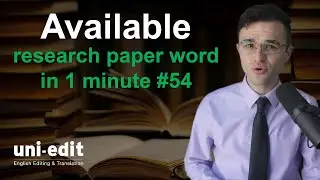How to write the Discussion section of your academic research paper
How to write the Discussion section of an academic research paper? In this video, you will learn about a research paper’s Discussion section and how to write one!
Watch all of our videos on the sections of an academic research paper: • Sections of a research paper
=====CHAPTERS=====
0:00 What is the discussion section?
0:48 Step 1 State your key findings
1:23 Step 2 Give interpretations of findings
2:41 Step 3 Discuss the implications
3:51 Step 4 Acknowledge limitations
4:59 Step 5 Share your recommendations
=====SCRIPT OF VIDEO=====
How to write the Discussion section of a research paper? My name is Antony P from the University English Hub and here are my super clear steps to writing your Discussion section, with examples! Keep watching until the end of the video to learn what NOT to put in your Discussion section.
The discussion section is your chance to explore the importance and relevance of your results. The key focuses of a Discussions section include a summary of your key results, an interpretation of what the results can mean, an investigation into potential implications of the results, like why they matter, an exploration of the limitations of the results, and finally, your Discussions section includes recommendations for future research.
Step 1: State your key findings
In about one paragraph, restate your research problem and summarize core findings in a clear statement that answers your research question.
Step 2: Give your interpretations of your findings
Write about how your findings exactly answer your research question. This may be obvious to you, but may not be obvious to an international audience.
You can identify correlations, and patterns in the data. You can discuss if the results supported your hypothesis or not. Then, compare and contrast your findings to the other research on your topic. Consider explaining how your results fit into the larger web of research.
Then, discuss any unexpected results and write about where you believe these unexpected results might have come from.
Step 3: Discuss the implications of your research
How do your findings fit within existing knowledge and what new insights do your findings contribute? Are there any consequences to an industry or profession because of your research?
If your findings challenge existing theories, explain why!
Step 4: Acknowledge the limitations of your research
Even the most robust studies have holes, or room for improvement. Common research limitations include small sample sizes, short observation lengths, and confounding variables. Write about the weaknesses in your research design so that other researchers can make improvements on your design.
Step 5: Share your recommendations
Your findings may impact a profession or an industry and this is your chance to dive into these potentialities. Perhaps your findings found an efficiency gain that an engineering company should consider, or perhaps your findings found a major flaw in past research that will encourage further studies.
What NOT to put in your Discussion section
Don’t introduce new results: You should only discuss the data that is reported in the results section.
Don’t make wild claims: Be realistic about what your data shows.
Don’t undermine your research: The discussion of limitations should aim to strengthen your credibility.
Now you’re ready to write your discussion section! Good luck! If you have any questions leave them below. I will read them and reply. Thanks for watching. To support this free content please like and subscribe and I’ll see you in another video. Bye!
=====PLAYLISTS=====
Punctuation in research writing https://bit.ly/3FSC1M3
Grammar in research writing https://bit.ly/3pPFhlO
Verbs in research writing https://bit.ly/3zkiJg1
=====UNI-EDIT SERVICES FOR AUTHORS=====
University English Editing & Translation service: https://uni-edit.net
Uni-edit specializes in language services for academics and researchers.
Research paper English editing: https://www.uni-edit.net/english-editing
Thesis and dissertation editing: https://www.uni-edit.net/phd-masters
School & job applications editing: https://www.uni-edit.net/School-appli...
Academic translation: https://www.uni-edit.net/translation
One-on-one academic English lessons: https://www.uni-edit.net/lessons
Email: [email protected]
WRT045




![[FREE FOR PROFIT] OG BUDA x FREERIO 3 Type Beat -](https://images.videosashka.com/watch/0Rt1aLIlSbk)














